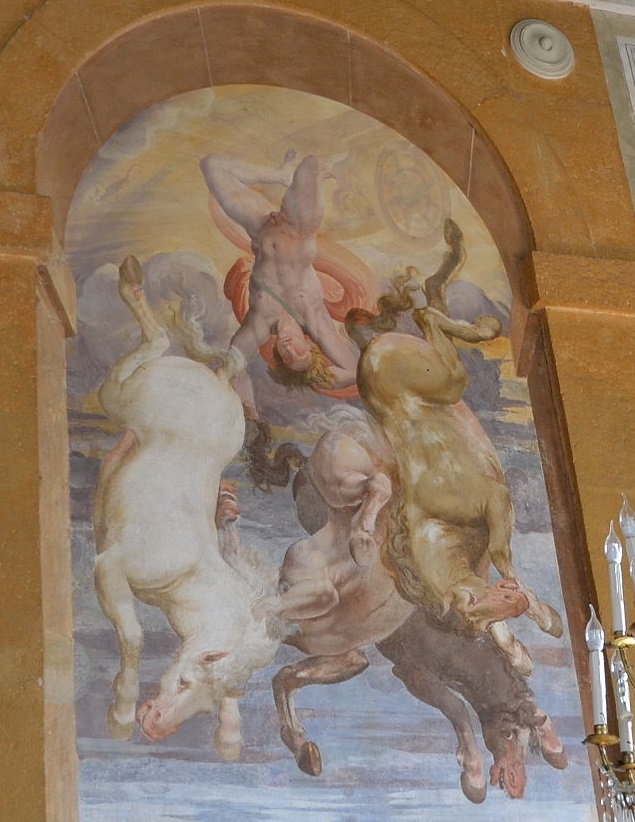‘Mysticism’ is for me a term with many positive connotations: though I know that there are some (primarily secularists) for whom it is a term of disparagement. I see it as primarily an attitude that recognises mystery, and thus the extent of our uncertainty and ignorance, very often in the sphere of religion and very often supported by states of temporary integration such as the Buddhist dhyana. I’ve written about the positive qualities of mysticism in a previous blog post, but here I want to focus on a problematic feature that has often accompanied it, and perhaps contributed to the negative views that some have formed. I call this problematic feature the ‘mystical flip’, and I’ve encountered it particularly in Mahayana Buddhism, including Zen, and related emptiness and non-duality type talk, but I’ve been surprised recently also to find it in a Christian context, reading Thomas Merton.
The mystical flip seems to start with refined and subtle experiences, perhaps in contemplation or meditation, where people dwell much more fully than usual in right-hemisphere dominated openness. If you want to know why this kind of state is right-hemisphere dominated, watch this TED talk by Jill Bolte Taylor: Bolte Taylor effectively describes a mystical experience that is created by the disabling of her left hemisphere. In this state, we lose the goal-orientation and the belief in linguistic representation that is characteristic of left hemisphere dominance. If they’re not accompanied by the disabling features of a stroke, such experiences can be helpful temporary integrated experiences. However, at some point they must finish, and we must go back to left hemisphere dominance.
In our normal mode, what do we make of this? Well, many people seem to immediately draw the conclusion that they’ve seen a higher ‘truth’. In this higher state there are no goals and no linguistic representations. Nevertheless, of course, back in the normal state there are goals and representations.  When talking about what they regard as mystical truths, then, the mystics claim that in some ultimate state there are no goals and representations, but when talking normally they flip back to admitting that normally, in the ‘conventional’ state, there are. This, then, is the mystical flip. Other terms for it, in various traditions, could be Nagarjuna’s Two Truths doctrine, or the divine versus human view, or the Spinozan ‘sub specie aeternitatis’ (from the standpoint of eternity) versus the standpoint of time.
When talking about what they regard as mystical truths, then, the mystics claim that in some ultimate state there are no goals and representations, but when talking normally they flip back to admitting that normally, in the ‘conventional’ state, there are. This, then, is the mystical flip. Other terms for it, in various traditions, could be Nagarjuna’s Two Truths doctrine, or the divine versus human view, or the Spinozan ‘sub specie aeternitatis’ (from the standpoint of eternity) versus the standpoint of time.
The Buddhist Diamond Sutra is a good example of a text that consists almost entirely of constant mystical flips. Here is one example:
Subhuti, do not say that the Tathagata [Buddha] conceives the idea: I must set forth a teaching. For if anyone says the Tathagata sets forth a teaching he really slanders Buddha and is unable to say what I teach. As to any Truth-declaring system, Truth is undeclarable, so “an enunciation of Truth” is just the name given to it. (21)
At one and the same time, such texts constantly insist that they have the truth from one perspective and that they do not from another, but there is rarely, if ever, any attempt to bridge the gap between the two perspectives.
Here is another example I discovered recently in Thomas Merton:
We are plagued today with the heritage of that Cartesian self-awareness, which assumed that the empirical ego is the starting point of an infallible intellectual progress to truth and spirit, more and more refined, abstract, and immaterial…. But in actual fact, Hui Neng says, there is no attainment, and therefore to busy oneself about seeking a “way” to attainment is pure self-deception. Zen is not “attained” by mirror-wiping meditation but by self-forgetfulness in the existential present of life here and now. (Mystics and Zen Masters, 25-6)
Merton here does the mystical flip not so much in terms of ‘truth’ as in terms of ‘self’, being apparently unable to engage with any third alternative between self-obsession and self-forgetfulness.
Of course, I’d rather that people were able to do the mystical flip than that they were just stuck on one side of it or the other. But it is, at best, a transitional stage in recognising and applying the Middle Way, and it certainly seems to me like a big mistake to identify texts, however hallowed, that merely do mystical flips as ones that tell us anything much about the Middle Way. The Middle Way is how you stop doing mystical flips, or at least slow them down or limit them. It requires you to reframe the ways you are talking about ‘absolute’ and ‘conventional’ perspectives so as to avoid getting into such a false duality in the first place.
The key ways I would suggest that we can avoid mystical flips amount to the five principles of Middle Way Philosophy as I identified them in an earlier post and in the first six of my introductory video series. Scepticism, the first principle, tells us why both absolute and conventional positions are uncertain, whatever experiences they may appeal to. Provisionality tells us how we can practically cultivate an attitude that doesn’t identify entirely with either the absolute or the conventional positions. Incrementality suggests ways of breaking down the absolute dualities involved and re-conceptualising them as increments. Agnosticism confirms us in our determination not to be sucked into either of the absolute sets of assumptions. Integration relates these to a process whereby we unite divided beliefs and energies in our experience rather than merely taking the side of one against the other.
In terms of the brain hemispheres, the Middle Way doesn’t just involve flipping from one dominance to the other, but rather using the right hemisphere perspective to inform and integrate the conceptual and goal-driven world of the left. Any spiritual perspective that simply leaves out the left hemisphere is inadequate to the vast majority of our experience and thus unable to transform it positively. But right-hemisphere experience can help us recognise the limitations of any particular set of goals and representations we may have grown accustomed to.
There is no need at all for anyone to get stuck at the stage of doing mystical flips. But unfortunately they seem to be very much reinforced by traditional authority in many traditions, as well as by the perception that there is no alternative. If we can avoid mystical flips we might also manage to avoid ethical flips (between absolute and relative positions) or scientific flips (between absolute belief in scientific results and disparaging science for its fallibility). There is an alternative.



